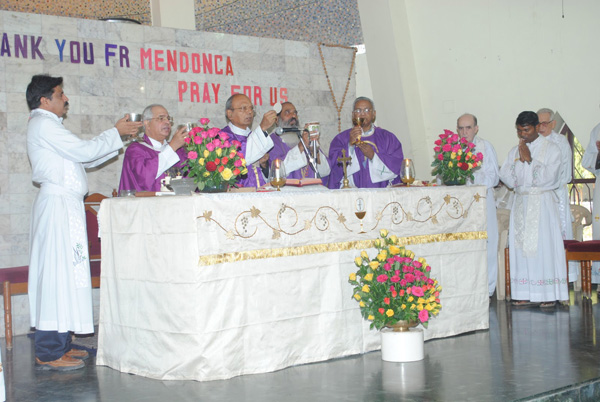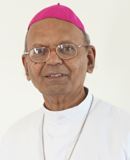Diocese of Baroda |
|||||||||||||||||||||||||||||||
|---|---|---|---|---|---|---|---|---|---|---|---|---|---|---|---|---|---|---|---|---|---|---|---|---|---|---|---|---|---|---|---|
 |
|||||||||||||||||||||||||||||||
Rite: |
Latin | Population: |
18,410,380 | ||||||||||||||||||||||||||||
Status: |
Diocese | Catholics: |
80000 | ||||||||||||||||||||||||||||
Founded: |
29-Sep-66 | Diocesan Priests: |
43 | ||||||||||||||||||||||||||||
| Total area: | 40365 Sq. km |
Religious Priests: |
130 | ||||||||||||||||||||||||||||
Province: |
Gandhinagar |
Religious Sisters: |
314 | ||||||||||||||||||||||||||||
Region: |
Western |
Seminarians: |
|||||||||||||||||||||||||||||
| Patron: | Jesus the Good Shepherd |
||||||||||||||||||||||||||||||
| Languages: | ?Adivasi Gujarati English Marathi Konkani Malayalam and Tamil. | ||||||||||||||||||||||||||||||
| Civil States: | Baroda Godhra Dahod Bharuch Narmada Surat Navsari Valsad and Dangs. | ||||||||||||||||||||||||||||||
Contact Diocese Office : |
Bishop's House Alkapuri - 71 Baroda - 390 007 GUJARAT | ||||||||||||||||||||||||||||||
Telephone 1:
|
0265-23 11 837 / 23 39 480 | Fax: |
23 39 480 |
||||||||||||||||||||||||||||
E-Mail Office: |
derozario@jesuits.net | Website: |
|||||||||||||||||||||||||||||
|
Rev. Fr. Stanislaus Fernandes SJ, Diocesan Administrator of Baroda |
|||||||||||||||||||||||||||||||
 |
|||||||||||||||||||||||||||||||
|
Name: |
Rev. Fr. Stanislaus Fernandes SJ | ||||||||||||||||||||||||||||||
|
Designation: |
Diocesan Administrator | Canonical Possession: | 2016- | ||||||||||||||||||||||||||||
Telephone (P): |
|||||||||||||||||||||||||||||||
| E-mail (P): | |||||||||||||||||||||||||||||||
| Other Present & Retired Ordinaries of the Diocese of Baroda | |||||||||||||||||||||||||||||||
|
|||||||||||||||||||||||||||||||
| Pilgrim Centres in theDiocese of Baroda | |||||||||||||||||||||||||||||||
|
Ecclesiastical Institutions |
Social / Charitable Institutions / Care Centres |
Educational Institutions |
|||||||||||||||||||||||||||||
Parishes: |
40 |
Hospitals: |
3 |
Degree Colleges: |
|||||||||||||||||||||||||||
Major Seminaries: |
Orphanages: |
3 |
Technical Training Centres: |
6 |
|||||||||||||||||||||||||||
Minor Seminaries: |
Special Schools: |
High Schools: |
38 |
||||||||||||||||||||||||||||
Monastries: |
Crèches: |
Lower Primary Schools: |
9 |
||||||||||||||||||||||||||||
Convents: |
Counselling Centres: |
Presses & Media Centres: |
|||||||||||||||||||||||||||||
Formation Houses: |
6 |
Social Centres: |
16 |
Professional Colleges: |
|||||||||||||||||||||||||||
Retreat Centres: |
1 |
Dispensaries / Clinics: |
27 |
Parallel Colleges: |
3 |
||||||||||||||||||||||||||
Physically Challenged: |
Higher Secondary : |
||||||||||||||||||||||||||||||
Boarding Houses: |
Upper Primary Schools: |
7 |
|||||||||||||||||||||||||||||
HIV / AIDS Centres: |
Nurseries/Pre-Primary : |
18 |
|||||||||||||||||||||||||||||
De-addiction Centres: |
1 |
||||||||||||||||||||||||||||||
| Aged & Destitute: | |||||||||||||||||||||||||||||||
History of the Diocese of Baroda |
|||||||||||||||||||||||||||||||
| The word Baroda is the Anglicised version of "Vadodara". For all practical purposes this Indianised version "Vadodara" has come to stay ever since the Central Government replaced the names of many of the big cities in India given by the British with Indigenous names and made it mandatory in all correspondence. In a way "Vadodara" is more appropriate and meaningful. 'Vad' means a banyan tree. Legend has it that there was a banyan tree whose overhanging roots spread so far and wide that it was later difficult to identify the mother tree. Very much like the Baroda Diocese. Only an appendix to the Archdiocese of Bombay till 1965 it was established as an independent diocese in 1966 by Pope Paul VI. In matter of just three and half decades the diocese has swelled to 38 Parish Centres of which 23 are located in rural areas. There are a total of 117 Institutes and 22 Women Religious Congregations 5 Men Religious Orders a veritable growth and our incessant efforts to spread the Kingdom of God to the far corners of Gujarat continue unabated. We are engaged in multifarious activities covering a vast spectrum-spiritual educational social economical cultural agricultural and ecological. In short everything that pertains to human development and the upliftment of the poor needy marginalized the downtrodden has been our deep concern. Whilst much no doubt has been done the diocese has a healthy restlessness to find ways to identify itself more with the tribal community since the mission of Gujarat is predominantly tribal. Some five decades ago our tribal community lived a relative peace and harmony in spite of having the bare minimum to subsist on. They were a happy lot. Thick jungles evergreen forests water in rivers and springs deer and peasants panthers and tigers were plenty The trees provided them with a home and tool for survival. The fish and the wild fowl were their food. A small plot of land provided cereals as food and cotton to weave their minimal loincloth. The tribal chief ensured that peace prevailed a sufficient and simple world. Not for long however with the passage of time technological progress has set in. Roads doubtless provide facilities but they also mean invasion. Forests are denuded the hills are eroded the rivers dried and the flora and fauna disappeared. Outsiders opened shops started money lending exploitation and gradually governed the economy. The tribal world started disintegrating. Their idyllic world was shattered. The Sphinx-like dictum now is "struggle or be devoured". Of late to cap it the peaceful atmosphere has been further disrupted and vitiated by certain hard core religious fundamentalist groups who are hell-bent on stirring up trouble. The cry of the tribals cannot be ignored be it an economical cry for survival or a socio-political cry or a cultural cry that the Church in Gujarat reaches out and responds to the tribal community. It is to this cry of the tribals that the Death-Resurrection Mystery of Christ invites us to share and break bread by being with them. In short it is faith that gives us a vision and the sustenance to create a just society a process in which we grow as much as they in the struggle for liberation. However we are also aware of by our limitations. We cater to only a small section of the tribal belt in Gujarat. There are disturbing question we face and have to be addressed. How best can we serve the interests of the tribals- Are we capable of really feeling the pulse of the tribals - their aspirations and hopes their worldview their psychological profile- Where is the delicate line between a ruthless exposure and a stifling insulation- How best to walk the tight rope between relief measures and development- Between avoiding dependency and creating self-reliance and organizing self-direction- How do we create a relevant local Church- And yet we believe that as in the Exodus experience the process of the traveler the pilgrim Church is in God's hands. He is aware of our needs "Consider the lilies of the field how they grow they neither toil nor spin yet I tell you even Solomon in all his glory was not arrayed like one of these. But if God so clothes the grass of the field which today is alive and tomorrow is thrown into the oven will he not more clothe you Oh men of little faith. |
|||||||||||||||||||||||||||||||
|
|
|||||||||||||||||||||||||||||||
| Prelates of the Diocese of Baroda | |||||||||||||||||||||||||||||||
|
|||||||||||||||||||||||||||||||
